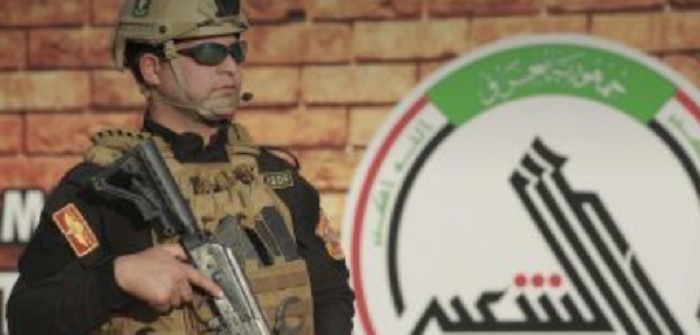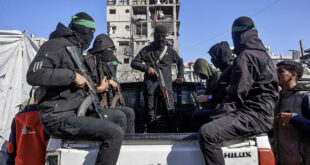
Zebari angered pro-Iran militias by calling for removal of the PMF from the heart of Baghdad.
Statements made by Kurdish politician Hoshyar Zebari questioning the deployment of the Popular Mobilisation Forces (PMF) in the Green Zone, where government offices and major international missions are located, and at Baghdad Airport have sparked a storm of controversy in Iraq.
Zebari’s remarks brought to the fore questions about security authorities’ ability to face the challenges embodied by negative Iranian influence in the Iraqi capital.
Zebari, a veteran politician and diplomat who has served as foreign minister and finance minister in the federal government, said that the United States had already informed Iraq of its intention to close its embassy in Baghdad due to the threat posed by groups linked to Iran and their repeated Katyusha-rocket attacks, noting that it was the responsibility of Prime Minister Mustafa al-Kadhimi to handle the status and role of the PMF inside the Green Zone and to ensure the security of the road linking the US Embassy building and the Green Zone.
Zebari believes that the PMF’s continued control of the Green Zone and its roads leading to Baghdad airport will not serve Iraq and its foreign relations, especially its relations with major powers.
Iraqi intelligence sources previously revealed to The Arab Weekly the presence of about 10,000 armed men linked to militias affiliated with Iran and the PMF in the heavily fortified Green Zone in central Baghdad, which includes the prime minister’s office, the House of Representatives, the defence ministry, the United Nations mission and the embassies of the United States and Britain.
The militias and parties affiliated with Iran reacted swiftly to Zebari’s statements by launching a massive campaign based on the claim that such statements are “violating the sacred,” according to MP Ahmed al-Asadi from the Fateh parliamentary bloc, which is led by the head of the Badr militia Hadi al-Amiri.
Asadi, who heads the militia of the Islamic Movement in Iraq, which is part of the PMF, said that “the PMF are a jewel in the crown of History and whoever desecrates their sacrifices is closer to being an enemy (than a friend),” stressing that “the PMF are a national military institution affiliated with the Iraqi state.”
Asadi called on Zebari to “keep in mind that if Erbil and all of our cities have preserved their prestige, it was thanks to the sacrifices of the PMF, and whoever interferes with their sanctity and stature is as if he was violating what we hold sacred.”
Iraqis are rather familiar with the concept of “the sacred” as used by the militias, as the latter resort to it quite often, especially in a sectarian context, and Asadi is one of the faces of sectarian extremism in parliament.
For his part, Naim al-Aboudi, a member of parliament representing Asaib Ahl al-Haq militia led by Qais Khazali, said that “removing the PMF from the airport and the Green Zone is an American demand, and Hoshyar’s statements echo those demands.” He too made sure to emphasise that “had it not been for the PMF, the whole political process in the country would have disintegrated.”
Aboudi brandished the threat of escalation if Zebari did not apologise. “If there is no apology for insulting the PMF, we will not be silent,” he said.
While Aboudi did not specify the nature of the response he was referring to, previous experience with the rogue behaviour of the militia to which he belongs suggests that targeting Kurdish interests and personalities in Baghdad through direct assassinations or missile attacks would be among the expected methods.
If direct attacks on their opponents prove to be very risky or impossible, the militias usually resort to playing the card of street demonstrations to exert pressure. They can easily mobilise hundreds of their members and the PMF themselves for political demonstrations.
Indeed it seems that the militias have now opted for protest, as an armed response may backfire in light of the increasing accusations levelled at these militias of undermining security in the Iraqi capital.
An unknown group calling itself “The Masses and Supporters of the Sacred Hashd (the PMF)” has called for a mass demonstration tomorrow on Saturday in Baghdad.
The group warned Kadhimi not to “stand in the way of the demonstrators or try to prevent them from expressing their views, because the reaction will be harsh.”
Observers say the insistence of pro-Iranian militias to bring up sectarian references in their discourse is an attempt to push the Shia majority in Iraq towards a clash with the Kurds, and thus create the ideal conditions for the activities of the armed groups to flourish and limit the ability of the government and its security services to have any impact on their presence and influence.
It is widely believed among Iraqi Kurdish and Sunni political circles that the Shia parties that receive orders from Iran are currently looking to start a sectarian conflict at any cost to save themselves from the growing hostile popular pressure, as they are accused of failing to properly manage the state and of stealing the country’s resources.
Observers expect militia forces to continue their sectarian escalation against the Kurds and Sunnis over the next few months before the elections, hoping that they will succeed in rallying the Shia masses behind them by appearing in the role of their defender.
The parliamentary bloc of the Kurdistan Democratic Party, to which Zebari belongs, said that the “attempt to alter” the statements of the former foreign minister regarding the PMF simply translates the position of one particular side “which cannot live with civil peace,” in reference to the pro-Iranian Shia political right and its militias that always tamper with the security file.
The Kurdish bloc believes that “at a time when the country is going through difficult political and economic conditions, and at a time when the Iraqi citizen is waiting for his representatives and political forces to come together to take the country out of the crises that plague it, there are those who try to fabricate problems in order to promote themselves at the expense of the interests of the Iraqi people. It seems that there are those who cannot coexist with civil peace and do not harmonise with the national consensus on preserving calm and closing ranks.”
“Focusing on commonalities and searching for solutions to Iraq’s problems will ultimately benefit all spectrums of the Iraqi people, and only those who do not want good for the homeland and its citizens will benefit from the escalation,” the statement concluded.
 Eurasia Press & News
Eurasia Press & News



